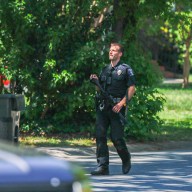With its seven-voice choir, dancing African guitars, chain-gang rhythms and prog-rock leanings, Bruce Peninsula is an unlikely convergence of sound.
If you listen closely between the call-and-response vocals, you can pick out the glockenspiel, tube bells, hammered dulcimer, washboard, vibraphone, timbale, marimba or even the karimba.
Just when you think you’ve got this 11-piece Toronto band pegged as some bizarre tribute to old time gospel, the two guitars, bass player and drummer fly off on a proggy tangent that wouldn’t be out of place on an old Jethro Tull record.
And at the heart of it all is hulking frontman Neil Haverty. He possesses a gravelly growl powerful enough to cement the band’s diverse elements together.
The band had its genesis when Haverty befriended Matt Cully and Misha Bower, two music fans immersed in the Appalachian Folkway recordings of Alan Lomax. They started experimenting with gospel and chain-gang songs. Friends were called in to provide extra voices.
Haverty, who is often joined by Bower on lead vocals, stresses that Bruce Peninsula is a collective.
“The truth is that there are five of us who actively contribute to the songwriting in the band,” he says.
The proggy elements came to fruition when Haverty introduced an old friend from Hamilton, Ont., Steve McKay, to the band. McKay had completed his classical music studies at Queen’s University where he had also developed a strong reputation as a rock drummer. When Bruce Peninsula needed a new drummer, he answered the call, bringing with him a love for ‘70s British prog rock.
“The prog stuff was going to happen anyways,” McKay says. “I was always a fan of Jethro Tull, King Crimson and Yes.”
The unlikely mix had the critics frothing more than a month before the official release of Bruce Peninsula’s debut album, A Mountain Is A Mouth.
“The buzz is like nothing I’ve experienced in my life,” McKay says about the over-the-top reviews. “It’s kind of overwhelming.”
















